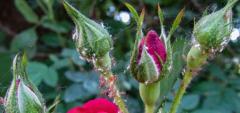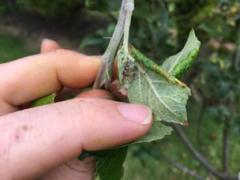by Vancouver Island Master Gardeners Association
Question: What are the bugs on my Roses?
Answer:
Aphids are tiny, woolly looking bugs with pear shaped bodies barely visible to the naked eye. The nymphs look like the adults: white, black, brown, gray, yellow, light green or even pink. They feed in large groups, so they are easy to spot.
The damage they create is also easy to spot; you will know you have an aphid infestation when you find misshapen, curling, stunted, yellowing leaves or leaves covered in sticky honeydew. When you find aphids around your rose bushes, you will also usually find ant colonies. Sticky honeydew is an indication that ants are present and busy protecting the aphids against beneficial insects.
Solutions
At first sighting of aphids, try spraying the leaves with water to simply displace them – they will typically not be able to find their way back to the same plant.
A larger infestation can be managed by dusting the plants with flour this slows them down and constipates them.
You can also try wiping or spraying the leaves of the plant with a mild solution of water and a few drops of dish soap. This should be re-applied every 2-3 days for a few weeks. Also, try adding a pinch cayenne pepper.
Neem oil, insecticidal soaps and horticultural oils purchased from a dedicated garden center are effective against aphids. Follow package directions.
You can make your own solution using Isopropyl alcohol:
Ethanol (grain alcohol) seems to work best. Alcohol usually comes in 70% strength in stores (or 95% strength purchased commercially).
To make an insecticidal spray, mix equal parts 70 % alcohol and water (or, if using 95 % alcohol, mix 1 part alcohol to 1 ½ parts water). When applying an alcohol or soap spray, or a combination, always test a small area first, and apply in morning or evening, when the sun is not beating down. Watch the plant for a few days for any adverse reactions before applying more. Plants can be sensitive to alcohol and soap. Also, some soaps have additives that can damage plants—select the purest form.
You can also add alcohol to a soapy emulsion to make it more effective. For example, in a spray bottle, combine 5 cups water, 2 cups alcohol, and 1 tablespoon liquid soap.
Essential oils are a great way to get rid of mosquitos and other insect pests including aphids. Try adding 4-5 drops of peppermint, clove, rosemary and thyme to a cup water; spray on the rose bushes in the morning and the evening, repeat until the aphids are gone.
For a visible infestation, remove entire leaves or branches. Start by removing leaves, wait a day, if aphids are still on the plant then remove a branch or two but not more than a third of the plant or it may die. Dispose of infected leaves in the garbage, not the compost; away from other plants where the aphids could spread.
Tips
Aphids are attracted to new growth on a rose bush growth almost 100% of the time. Fertilizing promotes new growth, faster.
1. Instead of fertilizing your rose bush all at once, apply smaller amounts of fertilizer throughout the year or try a slow-release solution.
2. Keep your rose bushes well-watered evenly throughout the year.
This is especially important during hot summer days or droughts.
When rose bushes aren’t watered or left to get too dry, they become weakened, which decreases their chances of producing chemicals that can help them fend off harmful pests like aphids.
Prevention
There are effective ways to prevent aphids from devouring your rose bushes as well. Source beneficial insects like ladybugs, lacewing, and parasitic wasps – they will feed on aphids. Ladybugs, lacewings, and chickadees keep ant colonies away. Ants are known to be attracted to aphids to protect them.
Companion planting can also help, for example, aphids are repelled by catnip. Aphids dislike garlic and chives – best when planted near lettuce, peas, and roses. Other plants that have strong scents that aphids hate oregano, onions, leeks, sage, and basil.
You can also grow plants that attract aphids in a different part of your garden or yard to prevent infestation to your rose bushes. These can be Zinnias, Dahlias, Cosmos, Asters, Calendula, Nasturtium, Hollyhocks and Chrysanthemums.
Photo credits:
Gardening dad: Proven ways to get rid of aphids on roses
Almanac aphids
Source: Almanac Aphids
For gardening questions in the growing season, contact the Gardening Advice Line.



